A 'Distinguished Villa' For Poirot's Captain Hastings
Actor Hugh Fraser's latest theatrical project is being rehearsed in Chiswick
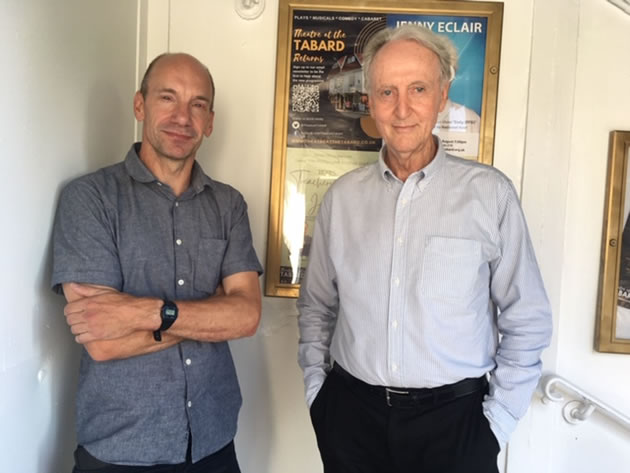 Hugh Fraser (on right) with Andrew Maunder, producer of Distinguished Villa
Hugh Fraser (on right) with Andrew Maunder, producer of Distinguished Villa
Actor and director Hugh Fraser, best known for his portrayal of Captain Hastings in the ITV television series 'Agatha Christie's Poirot', is directing a play which was last performed in a London theatre in the 1920s.
'Distinguished Villa' is a revival of a work by Irish novelist and playwright Kate O'Brien and is produced by Chiswick resident Andrew Maunder. It will open at the Finborough Theatre on 6 September and runs until the end of the month. It is the first London production of the play since its original performance.
Set in Brixton in 1926, the play centres around the lives of four characters and has been described as a humorous treatment of suburban life. But the team behind the revival of the play interpret it as more than that, and say it is complex and multi-layered, and speaks to many issues of contemporary life.
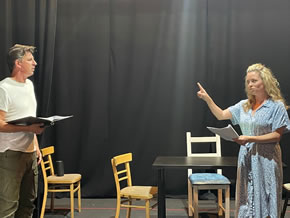
Matthew Ashford and Mia Austen in rehearsals
The plot revolves around Mabel Hemworth, who rules her house and husband Natty with a rod of iron, and is obsessed with keeping up appearances. Her rule-bound house is turned upside down with the arrival of new lodger Frances, who holds radical views on how women should live their lives. Mabel's sister Gwen, meanwhile, is planning an escape from the drudgery of her life. And when Natty falls for another woman, there are dire consequences
Academic and author Andrew Maunder, (University of Herefordshire), stumbled across the play while researching for a three-act play to produce. His previous productions for The Finborough include a revival of a Robert Graves play, 'But It Still Goes On' (2018) and St John Ervine's play Jane Clegg.
"Distinguished Villa is set in the Roaring 20's which people often think is a glamorous time but the attraction of this play to me was the ordinariness of it, people making a living."
Hugh Fraser adds, “There’s a realism to it that the audience will identify with, the issues include mental health, gaslighting in relationships, the role of women in society, many subjects that are pertinent today. Mental health issues were not spoken of openly in that era."
He was "immediately drawn" to the play when he was approached to direct, although he had not been familiar with the work of Kate O'Brien. A long-time resident of north London, he has been enjoying commuting west to Chiswick and the cast are rehearsing in The Tabard, which he describes as "a great venue.
"I had heard about the great pubs and restaurants in Chiswick and I've been enjoying that. I'm also very interested in the history of Bedford Park, close to where we are rehearsing at The Tabard Theatre. The Tabard Theatre has been wonderful and the cast are brilliant. It's been inspiring."
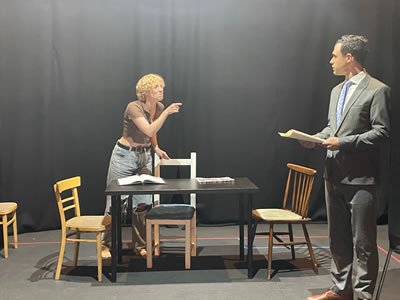
Hugh Fraser got first big break as an actor portraying Anthony Eden in the 1978 television series 'Edward & Mrs Simpson', after which he was frequently cast in upper-class roles. He also played the Duke of Wellington in the 'Sharpe' television series (opposite Sean Bean) and his film credits include 'Curse of the Pink Panther' and 'Patriot Games'.
But it is as the character of Captain Hastings in the ITV screen adaptation of 'Agatha Christie's Poirot' detective series that he is perhaps best known. Captain Arthur JM Hastings OBE is a fictional character created by Agatha Christie as the best friend and side-kick of the Belgian detective Hercule Poirot. The character first appears in 1920 in her novel, 'The Mysterious Affair at Styles' and Hastings was a character in seven other Poirot novels. The character was written into several episodes of the television series, in fact Hastings appears in 43 of the 70 episodes. Captain Hastings represents the traditional English gentleman, absolutely scrupulous and always concerned about "fair play".
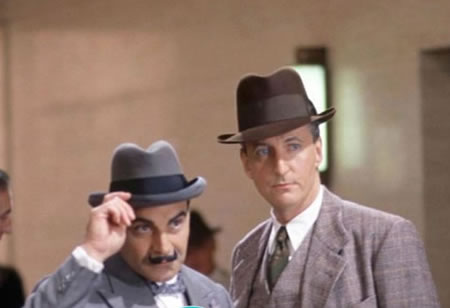
Hugh Fraser (on right) with David Suchet as Hercules Poirot. Picture: ITV
The series ran for nearly 25 years. The final episode 'Curtain, Poirot's Last Case' in which the detective dies from a heart attack, was watched by over five million viewers. "It was very emotional. David (Suchet) and myself, and the cast and crew were like family, we had worked together for so many years."
Hugh has also directed several plays, including a notable production of Chekhov's 'Uncle Vanya' at Wilton's Music Hall in 2007, and is the author of a series of crime fiction thrillers featuring contract killer Rina Walker. He is an associate tutor, director and member of the audition panel at the Royal Academy of Dramatic Art (RADA) specialising in Shakespeare. He has also narrated the audiobooks of Christie's works (HarperCollins).
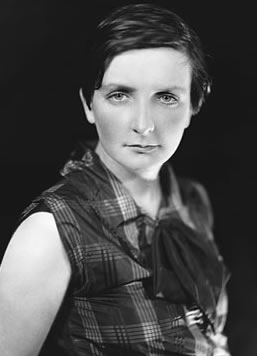
Novelist and playwright Kate O'Brien (1897 -1974) (pictured above) spent her formative years in Limerick, Ireland and moved to London in 1925 where she worked as a teacher. The success of 'Distinguished Villa', her first play, allowed her to become a full-time writer and she went on to have a distinguished career. Five years after the play was performed in London, at the Haymarket Theatre, also known as The Little Theatre, on The Strand (With Una O'Connor playing Maud and Ivor Barnard as Natty ), O'Brien had won the James Tait Black prize and the Hawthornden Prize for her debut novel, 'Without My Cloak'.
Many of her plays deal with issues of sexuality and female empowerment in a way that was considered quite radical and her 1936 novel, Mary Lavelle was banned in Ireland and Spain. One of her most famous works, 'The Land of Spices' was banned in Ireland immediately upon publication. As a feminist her novels promoted gender equality, and she was herself a lesbian, her 'life partner' was artist Mary O'Neill.
Hugh says, "Given that it’s set so soon after women were given the vote, the play also had a personal appeal to me, - my grand-aunt was a suffragette and took part in the Holloway Prison hunger strike (1909). In the 1920s there was the surface appearance that women were more independent and freed from the old expectations, but all the characters are actually imprisoned, and the question is 'can people break out or not?
"It says a great deal about convention, and the marriage relationship . It’s got love triangles, intrigue, and bad behaviour. It's quite outspoken, for example, there is a reference to sex outside marriage and a pregnancy outside marriage."
The play was initially censored for one line in which the character says that she ‘does not want to be a mother’ . This was considered to be an 'unnatural', feeling for a woman, and the line was removed from the original script by the British censor. 'Distinguished Villa' was an immediate hit with the public and reviewers immediately recognised O'Brien's talent.
The New York Times headline was ;"Irish girl typist's play a London hit- Kate O Brien, author of Distinguished Villa, is likely to share fame with Sean O'Casey." The Guardian wrote; "In Miss O'Brien we obviously have a new dramatist of some value." The Saturday Review called it "a masterpiece."
However one fundamental difference between Kate O'Brien's work and Sean O'Casey's was that she was writing about the social mores of the Irish and English middle-class whereas O'Casey's work was centred around working-class Dubliners.
Kate O'Brien's fame as a writer was probably at its height in the 1940s, before her works declined in popularity. Her books were revived in the 1980s, and she is considered a key Irish writer by Irish academics. She died in Canterbury in 1974. A Limerick Literary Festival named in her honour is held every year.
The play runs from Tuesday, 6th September until Saturday 1st October, at the Finborough Theatre, Presented by Andrew Maunder for Aardvark Theatre in association with Neil McPherson for the Finborough Theatre, 118, Finborough Road, London SW10 9ED.
For more information and to purchase tickets and click here
Anne Flaherty
Like Reading Articles Like This? Help Us Produce More This site remains committed to providing local community news and public interest journalism. Articles such as the one above are integral to what we do. We aim to feature as much as possible on local societies, charities based in the area, fundraising efforts by residents, community-based initiatives and even helping people find missing pets. We’ve always done that and won’t be changing, in fact we’d like to do more. However, the readership that these stories generates is often below that needed to cover the cost of producing them. Our financial resources are limited and the local media environment is intensely competitive so there is a constraint on what we can do. We are therefore asking our readers to consider offering financial support to these efforts. Any money given will help support community and public interest news and the expansion of our coverage in this area. A suggested monthly payment is £8 but we would be grateful for any amount for instance if you think this site offers the equivalent value of a subscription to a daily printed newspaper you may wish to consider £20 per month. If neither of these amounts is suitable for you then contact info@neighbournet.com and we can set up an alternative. All payments are made through a secure web site. One-off donations are also appreciated. Choose The Amount You Wish To Contribute. If you do support us in this way we’d be interested to hear what kind of articles you would like to see more of on the site – send your suggestions to the editor. For businesses we offer the chance to be a corporate sponsor of community content on the site. For £30 plus VAT per month you will be the designated sponsor of at least one article a month with your logo appearing if supplied. If there is a specific community group or initiative you’d like to support we can make sure your sponsorship is featured on related content for a one off payment of £50 plus VAT. All payments are made through a secure web site. |
September 9, 2022